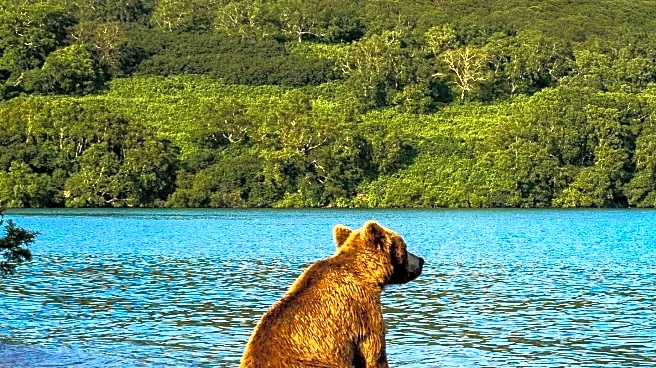What is the story about?
What's Happening?
Voting for the annual Fat Bear Week competition has commenced at Katmai National Park in Alaska. This event pits brown bears against each other as they prepare for winter hibernation by gaining weight. The competition, which started as a one-day event in 2014, has grown significantly, attracting global attention and participation. Last year's winner, Grazer, is competing again, alongside Chunk, who suffered a broken jaw earlier this year. The contest is organized by explore.org in partnership with the National Park Service and the Katmai Conservancy, and it aims to highlight the bears' preparation for hibernation and their survival strategies.
Why It's Important?
Fat Bear Week serves as an educational tool, raising awareness about the natural behaviors and survival strategies of brown bears. It highlights the importance of conservation efforts in national parks, where wildlife can thrive. The event also engages a global audience, fostering interest in wildlife conservation and the ecological significance of salmon runs. By showcasing the bears' weight gain, the competition underscores the critical role of healthy ecosystems in supporting wildlife. The event's popularity reflects growing public interest in environmental issues and the need for continued support for conservation initiatives.
What's Next?
As the competition progresses, participants will continue to vote for their favorite bears, with the winner being crowned the fattest bear. The event will likely draw increased attention to the conservation efforts at Katmai National Park and the importance of preserving natural habitats. Organizers may use the event's success to further promote educational programs and initiatives aimed at protecting wildlife. Additionally, the competition could inspire similar events in other regions, highlighting the global importance of conservation.
Beyond the Headlines
Fat Bear Week not only entertains but also educates the public about the ecological dynamics of bear populations and their reliance on salmon runs. It raises ethical considerations regarding human interaction with wildlife and the impact of climate change on natural habitats. The event encourages discussions on sustainable practices and the role of national parks in preserving biodiversity. By engaging a wide audience, it fosters a deeper understanding of the interconnectedness of ecosystems and the need for responsible stewardship.















